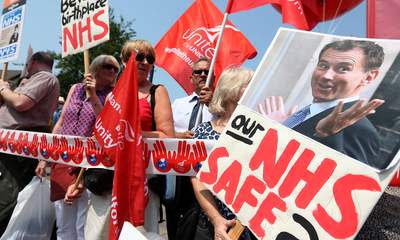Trafford Hospital A&E Closure To Go Ahead

Health Secretary Jeremy Hunt has given the go-ahead to plans to shut the accident and emergency department at Trafford General Hospital.
Campaigners have fiercely opposed the closure of the A&E unit in the Manchester hospital, which is widely regarded as the birthplace of the NHS.
But following a review of the plan by the Independent Reconfiguration Panel (IRP), Mr Hunt confirmed that the closure can go ahead - provided that nearby A&E departments consistently meet national waiting time targets.
Mr Hunt told the House of Commons changes are "necessary to provide safe and sustainable healthcare in the North West".
But campaign group Save Trafford General said the move makes "no sense".
Chair Matthew Finnegan said: "It is tearing the heart out of the hospital - the birthplace of the NHS - and that means that the hospital's future is in real danger.
"It will mean that patients will have to travel further and wait longer for treatment.
"Local people will be appalled and disgusted that they have not been listened to."
Local councillors also appealed to Mr Hunt to review the decision, saying they were concerned the plans were "principally financially motivated" and could put pressure on other hospital sites.
Health bosses in the region say the way services are delivered in Trafford and Manchester needs to be fundamentally redesigned.
The plans involve the removal of A&E services at Trafford General between midnight and 8am, and for the rest of the time the unit will be downgraded to an urgent care centre. It will eventually be downgraded to a minor injuries unit.
Emergency surgery will no longer be provided at the site and the intensive care unit will shut.
Mr Hunt referred the matter to the IRP, which concluded that the "clinical case for change is clear", MPs heard.
Last week celebrations were held at the hospital to mark the 65th anniversary of the NHS. Trafford General is known as the birthplace of the health service as it treated the first NHS patient in 1948.
Health bosses said the hospital has the second smallest A&E department in the country, with an average of six to 12 people using the service between midnight and 8am.
At its busiest hour on an average day the unit is only treating seven people.
The New Health Deal for Trafford, the consultation document outlining the changes, says most patients with life-threatening illnesses or injuries are taken directly to Salford Royal Hospital, Wythenshawe Hospital or Manchester Royal Infirmary.
It also says some services at the hospital are "not clinically sustainable" and could "become unsafe in the future".
It says that a safe intensive care unit needs to treat a minimum of 200 patients each year, but Trafford General Hospital only admitted 93 patients for intensive care in 2010/11.

 Yahoo News
Yahoo News 